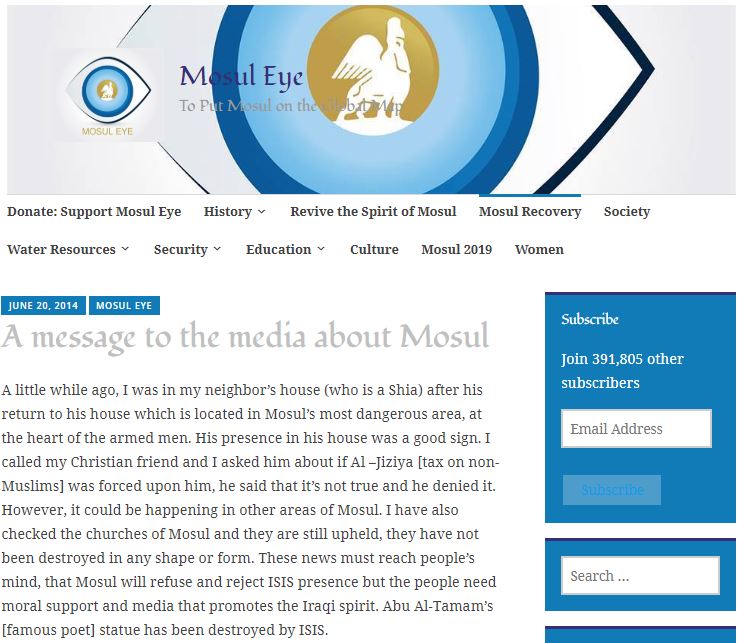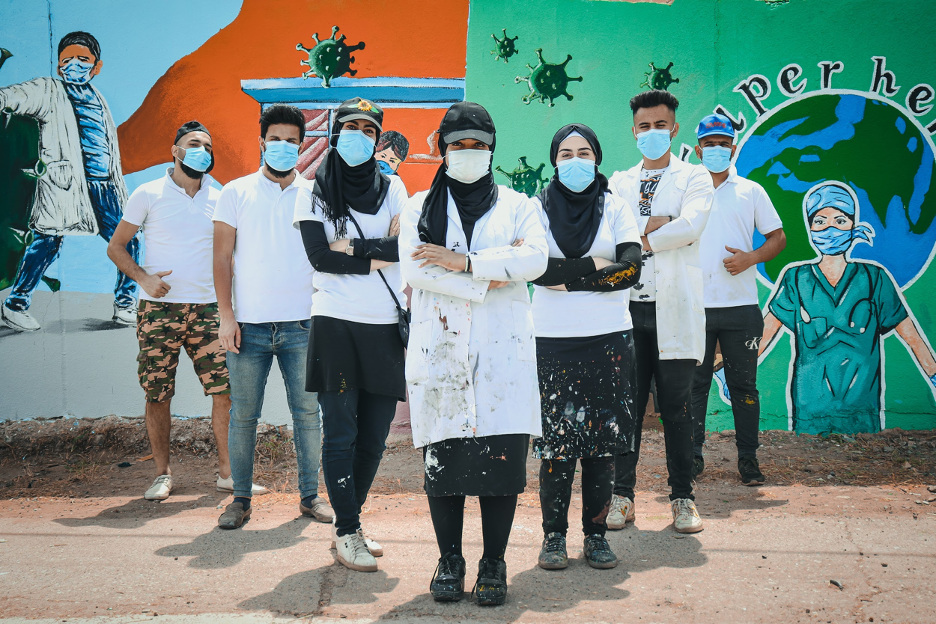In the days following Daesh’s invasion of Mosul in June 2014, an anonymous Facebook page began documenting the atrocities committed by the terrorist group in the city, despite the personal danger of such an act. Throughout Daesh’s occupation, the continuous reporting on Mosul Eye was a major source of information not just for Moslawis, but also for the international community.
In December 2017 Omar Mohammed gave up his anonymity but not his commitment to creating a historical record. Even after the liberation of the city in July 2017, Mohammed has continued to highlight the resolve of the city’s residents not to be defined by its years under Daesh. In his own words, “Mosul is not ISIS.”
In conversation with the Global Coalition against Daesh to mark the three year anniversary of the liberation of Mosul, Mohammed discusses the power of Moslawi youth to mobilise as a strong sector of civil society and his determination to “put Mosul on the global map again.”
You started Mosul Eye first as a Facebook page in 2014 shortly after Daesh invaded the city – what were you hoping to achieve in those early days?
I still remember the moment when I decided to open the Mosul Eye page – the same night of the attack of so-called ISIS. The moment I decided to do this it was the feeling of having the responsibility of protecting the city from such a terrorist organisation. I also felt that this time it was completely different from any other attacks that had happened in the city of Mosul. I saw this criminal group was well organised. They brought new weapons, new cars, they brought their posters, they implemented their rules in the early days of their occupation. That’s what made me feel afraid that this was different. And someone had to do something.
How paranoid was Daesh about independent reporting on their control of the city? Did they try to exert total control over the information environment?
When ISIS controlled Mosul they controlled everything. They arrested journalists, they killed them, they were killing everyone who was against them, whether in words or in actions. When Mosul Eye was there and daring to make daily updates that no one actually dares to do, the message that [ISIS] got is that they are not alone in the city and there is an entity called Mosul Eye that they cannot stop from reporting. It gave hope to the people of Mosul that at least our voice is not silenced. And this reminds me of how many messages I used to receive on the Mosul Eye Facebook page from people from Mosul who would say we are afraid of commenting but we are with you, we support you, we thank you for this. This gave me the strength and the hope to continue.
“The message that ISIS got is that they are not alone in the city and there is an entity called Mosul Eye that they cannot stop from reporting. It gave hope to the people of Mosul that at least our voice is not silenced.”

Social media has played a large role throughout the conflict – it has been exploited by Daesh for propaganda purposes, but also allowed you to reach an audience outside Mosul, at a time where many atrocities went unreported in traditional media. How do you think a balance can be found between its opposing uses?
This was a very important element of the evolution of Mosul Eye as a platform speaking on behalf of Mosul not only locally but internationally. That’s why I decided to report in English because I understood the atmosphere in Mosul. I understood the atmosphere of how ISIS was manipulating the media and making reports in English and other languages. So I thought, if I keep reporting in Arabic I might not have the same impact as when I make updates in English. And I was right. When Mosul Eye was picked up by the international media and the international media was relying on it, Mosul Eye was the only source inside the city of Mosul with detailed information. It gave Mosul Eye another push towards confronting and challenging ISIS more and more.
Although Mosul Eye was started during Daesh’s occupation of the city, you’ve continued writing the blog since its liberation. How important is it to continue documenting the reconstruction of the city following its liberation?
The mission of Mosul Eye wasn’t just to report ISIS or what was happening in the city. The other element of the evolution of Mosul Eye was the destruction by ISIS. One gain we had from the occupation of ISIS is that for the first time we have seen that the youth of Mosul is mobilised for the good, mobilised as a civil society. So Mosul Eye wanted to give those young people a platform in order to practice their freedom of speech, in order to show their work to the rest of the world.
In previous interviews you’ve stated that you’re a historian rather than a journalist. How can the history of Mosul best be preserved both in terms of a physical space, but also in terms of your writing as a historical record?
Yes, I am a historian and I always insist on being a historian rather than a journalist. It’s not to underestimate journalism, but because what ISIS did wasn’t something targeting journalism only. ISIS was playing on the deep roots of the history of the city of Mosul when they destroyed historical artefacts, historical sites, archaeological sites, when they deconstructed the society of the city of Mosul, when they deported Christians, enslaved Yazidis and committed genocide against them. All the atrocities ISIS committed against the society of Mosul were meant to change the reality and the narrative as well as the history of Mosul.
That’s why it’s crucial to preserve history in order to stop ISIS controlling the future of the city. If you hold and control the historical narrative, you will control the future of the people, and this is what we don’t want ISIS to do. They are defeated but the battle on the historical narrative is still there and we have to win this by making more public records and archives, building museums, reminding people through all different forms of communication to keep this memory from being damaged by ISIS.
“It’s crucial to preserve history in order to stop ISIS controlling the future of the city. If you hold and control the historical narrative, you will control the future of the people, and this is what we don’t want ISIS to do.”
In the three years since Mosul was liberated from Daesh, how far have reconstruction projects allowed a return to life before Daesh? And what still needs to be done?
I don’t want to seem pessimistic, because there is reconstruction in the city of Mosul, there is hope, there is the good will of the people who want to contribute to the reconstruction of Mosul. But on the infrastructure of the city, I am afraid it’s still slow. We hope that more will be rebuilt.
I’m glad that the old market of Mosul which is the economic heart of the city has been almost completely recovered. We have conducted a survey and the result was beautiful because hundreds of shops have returned: the artisans, the old shops, the spice markets, the fish market, the blacksmith et cetera. All of them have returned and this is a good sign.
We also have the reconstruction of one of the most symbolic sites of Mosul, al Nuri Mosque, as well as al Tahira Church and al Saa’a Church. These are symbolic sites that can give hope to the communities of Mosul. We also have the recent beautiful news of the Yazidi families returning to Sinjar, and other families from different communities returning to their villages, leaving the camps. We hope to see the camps being closed soon.

How has the COVID-19 pandemic affected life in Mosul? And how are local community initiatives in the city adapting to the challenges posed by the virus?
So far the situation is under control. We have some cases, although we are afraid of the lack of medical equipment, medical staff, and ventilators (the city of Mosul has only fifteen ventilators, only ten of them work). So we are afraid the numbers will be higher than we can afford. But with the local government of Mosul and civil society, we have started lots of campaigns to raise awareness about the pandemic and to help people be careful and take measures to protect themselves from the pandemic.

What is your hope and message for the future?
I always have hope, I always believe in the future, I always believe in the power of the youth of Mosul to contribute to building a better future for the city. There is huge potential for a very strong future in Mosul. What gives me hope is that I have started seeing start-ups, small enterprises, young entrepreneurs – it’s growing.
Always look at Mosul as a beautiful city. Do not focus on these few years of ISIS. Mosul is not ISIS.
I was also surprised to see a very beautiful video from Mosul University of Moslawi students who speak almost in ten languages – Dutch, English, French, German, Russian, and other languages. I was surprised to see them. But those young people who have decided to return to Mosul are taking responsibility for rebuilding the city. There is hope for Mosul. If we continue these efforts, I think we will have a better future.
My message to the world is always look at Mosul as a beautiful city. Do not focus on these few years of ISIS. Mosul is not ISIS. ISIS wanted to damage the reputation of the city. Mosul has much more beautiful elements to explore. We have hundreds of tourist sites – hopefully we will be able to rehabilitate them to invite the world to visit. We have a beautiful and important university in the city of Mosul. This university is our window to the world. Please communicate with the university, get in touch with them. Send us books, send us trees, send us supportive messages (the least you can do if you cannot send books). Always send us these kinds of messages because we take it seriously and we feel we are being taken care of, we are still part of the world.
Help us put Mosul on the global map again, undo the terrorism of ISIS to prevent this from happening again, and build co-existence and a better future for Mosul and for the rest of the world.
Moslawis at the beginning of 2020 expressing their wishes for the city over the coming year. Please note, this was filmed before COVID-19 safety measures came into effect.

